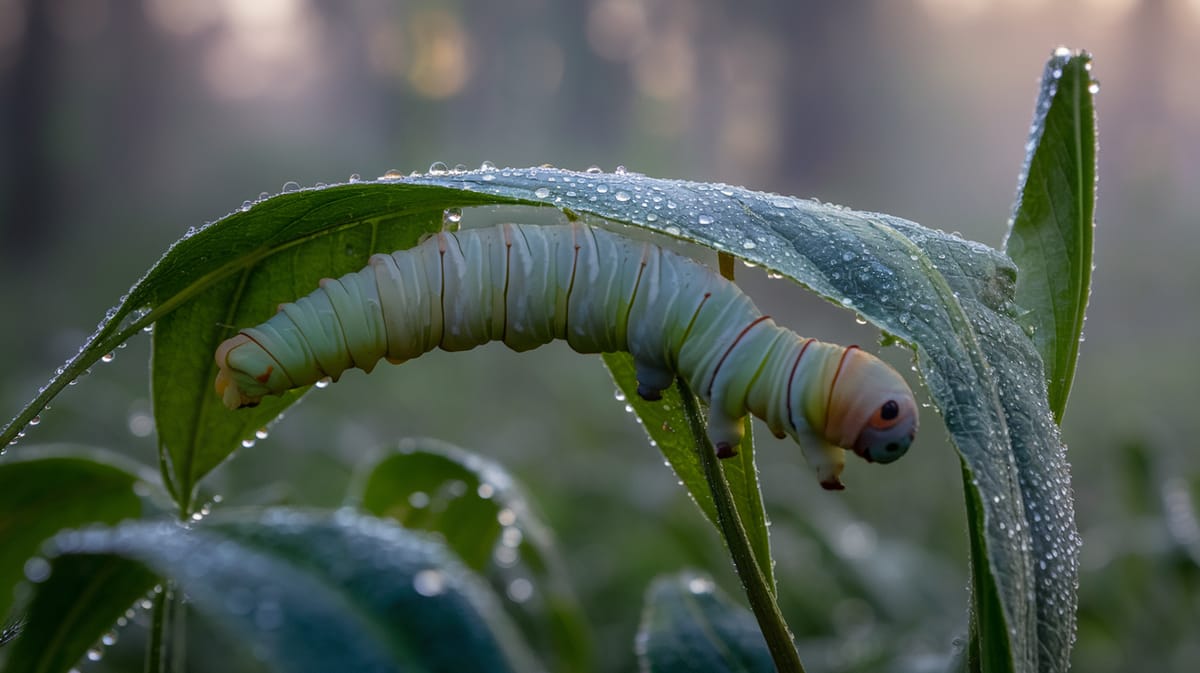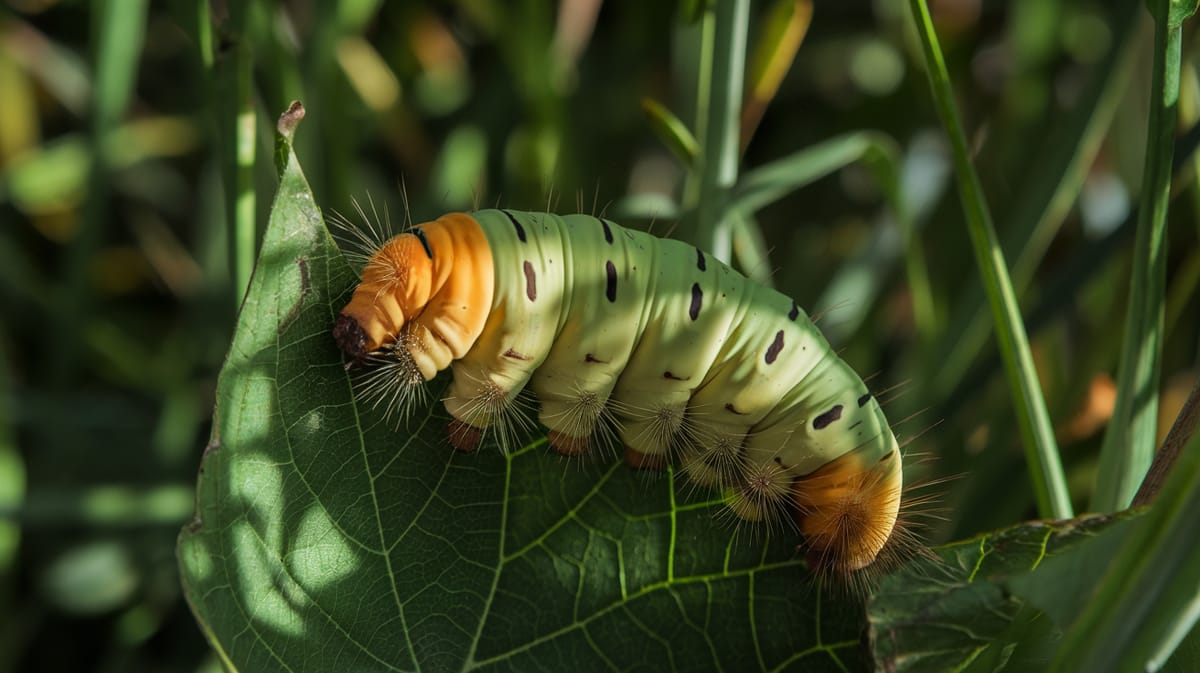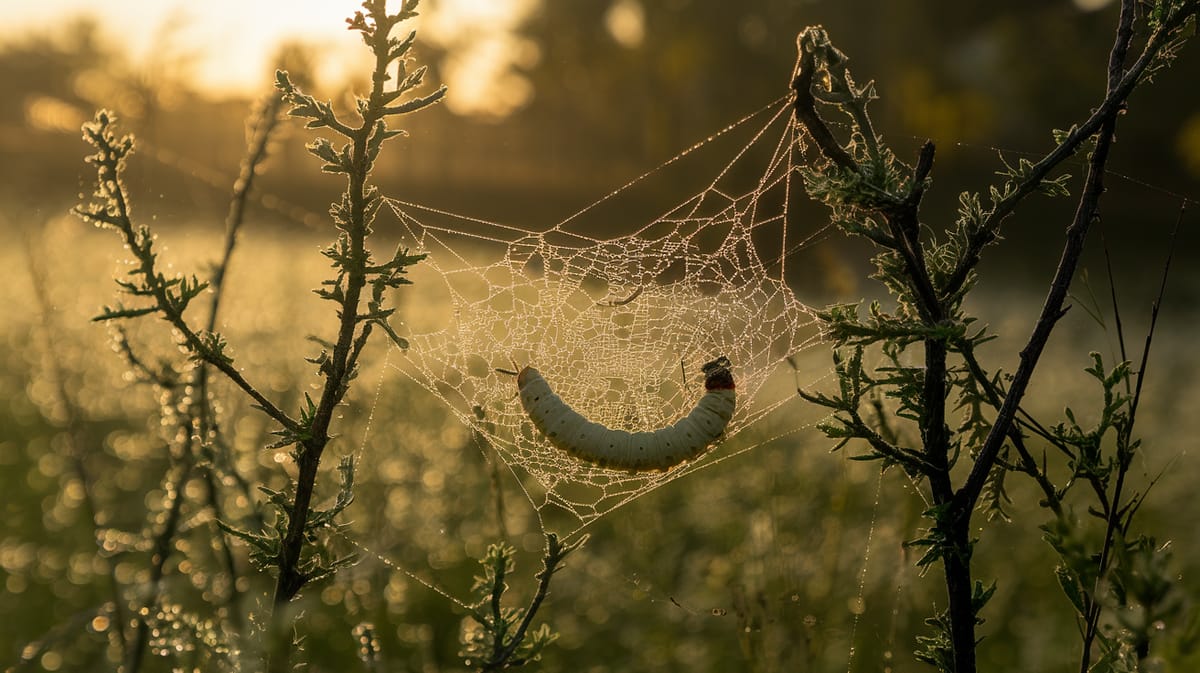Tent Caterpillar
Architects of silk and social living, Tent Caterpillars weave protective nests while maintaining intricate social structures. These caterpillars play a crucial role in forest ecosystems by aiding in nutrient cycling.

Key Insights at a Glance
Did You Know?
Taxonomy & Classification
Tent caterpillars are known for their communal silk-spinning behavior and ability to defoliate trees rapidly, reflecting their adaptation to temperate and boreal ecosystems. Let's understand the evolutionary journey and classification of these remarkable herbivores.
Global Presence
The Malacosoma genus includes 26 species, predominantly found in North America and Eurasia, illustrating their adaptability to different climates.
Evolutionary Success
Evolving around 30 million years ago, tent caterpillars have survived diverse environmental changes, showcasing their resilience through natural selection.
Lifecycle and Growth
A remarkable journey of transformation from Egg to Adult.
Egg
Laid in clusters on tree branches, eggs overwinter and hatch in spring, synchronized with the budding of host trees.
Larva
Emerging from eggs, larvae form silk tents and feed collectively on leaves, undergoing several molts to grow.
Pupa
Within a silken cocoon, larvae undergo metamorphosis, transforming into adults ready to emerge.
Adult
Moths emerge with a singular focus on reproduction, laying eggs before their short life ends.
Dietary Habits
Voracious leaf eater, adept at stripping foliage from deciduous trees, using silk tents for communal living and feeding.
| DIET TYPE | DESCRIPTION |
|---|---|
| Primary Diet | Primarily consumes leaves of cherry, apple, and other deciduous trees, often causing significant defoliation. |
| Secondary Diet | Occasionally feeds on leaves of shrubs and small plants, adapting to available vegetation when its primary food is scarce. |
| Occasional | Rarely consumes leaves of coniferous trees, typically in situations where preferred foliage is unavailable. |

Behaviour and Adaptations
Discover the fascinating adaptations that allow the Tent Caterpillar to thrive in its environment.
Social Coordination
Highly organized colonies build protective silk tents for shelter and warmth.
Thermoregulation
Use group behavior to regulate temperature, optimizing growth and development.
Chemical Communication
Release pheromones to coordinate movements and warn of predators.
Ecosystem Impact
Tent Caterpillars play a crucial role in maintaining ecosystem health and balance.
Nutrient Recycler
Enhances soil fertility through leaf litter decomposition.
Food Source
Serves as a primary food option for birds and small mammals.
Biodiversity Promoter
Encourages plant diversity by selective feeding on dominant tree species.
Conservation Challenges
Understanding and addressing the major threats to Tent Caterpillar populations.
Habitat Loss
Deforestation and urbanization reduce essential breeding grounds for Tent Caterpillars.
Climate Change
Altered weather patterns impact lifecycle and food availability for Tent Caterpillars.
Chemical Exposure
Pesticide use affects Tent Caterpillar survival and ecosystem health.
Frequently Asked Questions
How long do Tent Caterpillar live?
Tent Caterpillars typically live for six to eight weeks. They hatch in early spring, feed, and grow for about six weeks before forming cocoons. The adult moths then emerge, mate, and lay eggs, leading to the next generation of caterpillars.
What do Tent Caterpillar eat?
Tent Caterpillars primarily feed on the leaves of deciduous trees like cherry, apple, and crabapple. They can also consume leaves from other fruit trees and shrubs. Their feeding can sometimes lead to noticeable defoliation but rarely causes long-term harm to healthy trees.
Are Tent Caterpillar poisonous?
Tent Caterpillars are not poisonous to humans. They can cause skin irritation or allergic reactions in some people due to the tiny hairs on their bodies. They are not toxic to pets, but consuming large quantities might cause digestive upset.
Are Tent Caterpillar endangered?
Tent Caterpillars are not considered endangered. They are common and widespread in many regions. Their populations can fluctuate significantly from year to year, often influenced by environmental conditions and natural predators, but they generally maintain stable numbers.
What do Tent Caterpillar symbolize?
Tent Caterpillars can symbolize change, growth, and transformation due to their life cycle from caterpillar to moth. In some cultures, they may represent persistence or teamwork, as they live in communal silk tents and work together to feed and grow.
Do Tent Caterpillar bite?
Tent Caterpillars do not bite humans. They lack the necessary mouthparts to bite people or animals. While they may appear intimidating due to their size and numbers, they are harmless and primarily focused on feeding on leaves.
What color are Tent Caterpillar?
Tent Caterpillars are usually black or dark brown with a white stripe running down their back. They have blue and yellow markings on their sides, and their bodies are covered with fine, light-colored hairs, giving them a fuzzy appearance.
Does a Tent Caterpillar have wings?
Tent Caterpillars themselves do not have wings. They are the larval stage of moths. After pupating, they emerge as adult moths with wings, allowing them to fly, reproduce, and lay eggs for the next generation of caterpillars.
What does a Tent Caterpillar look like?
Tent Caterpillars are medium-sized, hairy caterpillars with distinctive markings. They have a white stripe along their back, blue and yellow side markings, and fine hairs covering their bodies. They often form silk tents in trees, where they gather in groups.
Is a Tent Caterpillar an insect?
Yes, a Tent Caterpillar is an insect. It belongs to the order Lepidoptera, which includes butterflies and moths. As a caterpillar, it represents the larval stage of certain moth species, undergoing metamorphosis to become an adult moth.
Related Insects
Discover insects with similar characteristics to Tent Caterpillar - including shared habitats, diets, and taxonomic classifications
Share this profile
Help others discover Tent Caterpillar
